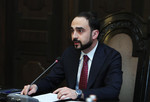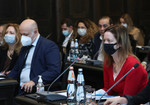Friday, 19 February 2021
Tigran Avinyan Chairs SME Development Council Meeting
On February 19, the Small and Medium Enterprise Development Council held its 18th sitting, chaired by Deputy Prime Minister Tigran Avinyan. The meeting was attended by Chargé d’Affaires of the United Kingdom of Great Britain and Northern Ireland in Armenia Helen Fazey, and Head of the Yerevan Office of the European Bank for Reconstruction and Development (EBRD) Dimitri Gvindadze.
Addressing the meeting, the Deputy Prime Minister said:
“Dear Colleagues,
Welcome to the 18th sitting of the Small and Medium Enterprise Development Council. Before discussing the agenda, I would like to address a number of issues related to the development of the SME sector. 2020 was a year of multiple challenges for Armenia - the global pandemic that was officially recorded in Armenia early last year, then the war unleashed by Azerbaijan against Artsakh. All this had a disruptive effect on the economy and socio-economic life. We closed the economic year with an economic decline of about 7.5%, which had tangible social consequences.
Last year made more visible those deep-seated problems that had been accumulating and characterized our country’s economic system, as a whole. I mean, in particular, the lack of competitiveness and the insufficient level of technological development, which had resulted in poor immunity against force majeure situations. These problems are more pronounced in small and medium enterprises.
In addition to redefining this reality, it raises the need to rethink our economic policy in line with existing challenges. In this context, industrialization, technological modernization, and gaining a competitive position in international value chains should be seen as a priority in boosting the competitiveness of small and medium-sized enterprises.
All those present are undoubtedly aware that as part of the roadmap published by the Prime Minister, the Government on February 4 approved the Economic Response Program and a relevant action plan, which seeks to stimulate economic activity over the next in the next six months. While the Program implies a short-term agenda, all activities and measures included in it should also contribute to economic recovery and sustainable development in the medium term. The Program envisages regular consultations with the private sector, through which we will try to identify problems and find solutions. We can consider that this meeting marks the beginning of those consultations.
In conclusion, I would also like to welcome and thank our international partners for attending today’s event.”
Greeting the participants, UK Chargé d’Affaires Helen Fazey reaffirmed her country’s commitment to continue supporting the measures that could promote economic development in Armenia. She stressed the need to introduce tools that can help effectively address the existing problems.
Head of the EBRD Yerevan Office Dimitri Gvindadze presented the dynamics of the Bank’s operations in Armenia. He advised that the EBRD operations in Armenia reached a record level of 160 million euros last year, about 93% of which targeted the private sector. He noted that the EBRD is keen to support the public-private sector economic dialogue, which in turn could help develop private enterprise in Armenia.
The speakers next weighed in on the problems existing in the field of public procurement, the possibilities and prospects for their solution. Issues related to large retail chains, including supplies, sales of local products, etc. were discussed during the meeting.
Reference was also made to the labeling process and the possibility for raising Haypost’s tariffs for delivery services. The need for the banks to expand the range of financial access instruments was reviewed during the meeting.













